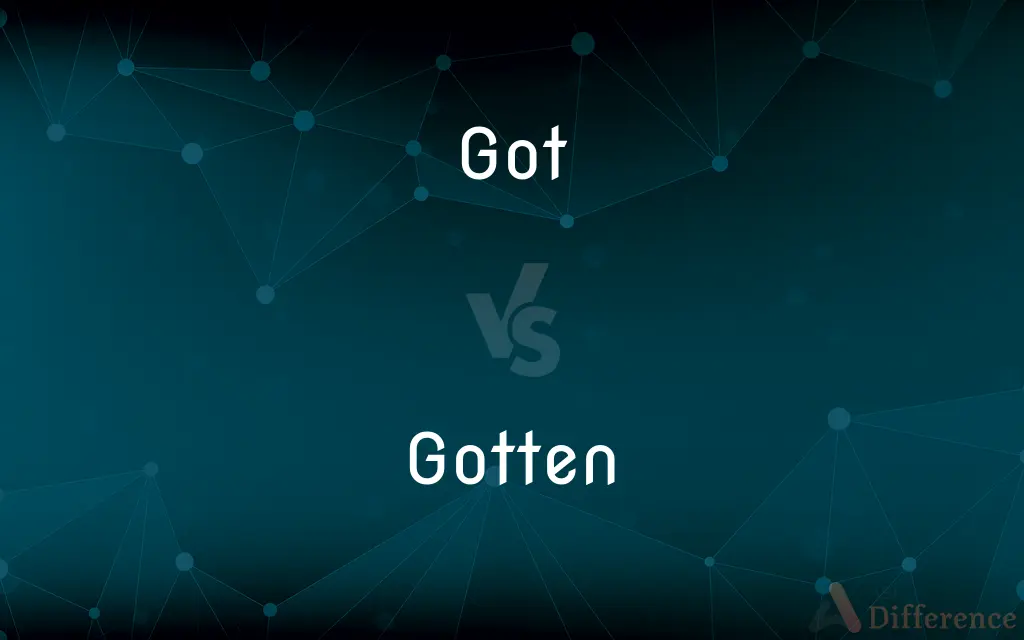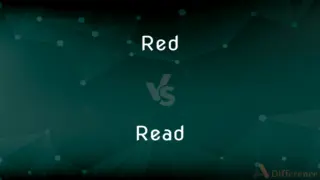Got vs. Gotten — What's the Difference?
By Tayyaba Rehman & Fiza Rafique — Updated on March 29, 2024
"Got" is the past tense of "get" in American and British English, while "gotten" is the past participle in American English, reflecting acquisition or change.

Difference Between Got and Gotten
Table of Contents
ADVERTISEMENT
Key Differences
"Got" serves as the past tense and past participle of "get" in British English, indicating possession or the process of receiving something. In American English, while "got" is also used as the past tense, "gotten" is the preferred past participle, emphasizing the action of obtaining or becoming.
In terms of usage, "got" is universally accepted in expressions like "have got" to mean "must" or "have," irrespective of the variant of English. On the other hand, "gotten" is typically used in American English to denote the completion of an action, such as obtaining, acquiring, or becoming something.
When it comes to nuances in meaning, "got" in British English often conveys possession or the act of receiving without specifying the completion of the action. Conversely, "gotten" in American English implies a completed process of acquiring or changing.
The choice between "got" and "gotten" can also influence the tone and clarity of a sentence. For example, "I have got a new car" might simply imply possession in a general sense, whereas "I have gotten a new car" clearly indicates the acquisition of a new car recently or in the recent past.
Regarding grammatical correctness, both "got" and "gotten" are correct within their respective dialects. It's important for writers and speakers to be consistent with the use of these terms based on the variant of English they are using or targeting.
ADVERTISEMENT
Comparison Chart
Definition
Past tense and past participle of "get" in British English; past tense in American English.
Preferred past participle in American English.
Usage
Used to indicate possession, receiving, or being obliged.
Used to indicate the completion of obtaining or becoming.
Nuance
Often conveys possession or the act of receiving.
Implies a completed process or change.
Tone & Clarity
Can imply possession in a general sense.
Indicates a recent acquisition or change more clearly.
Grammatical Use
Correct in both American and British English as past tense; past participle in British English.
Correct as a past participle only in American English.
Compare with Definitions
Got
Possession.
I've got two tickets to the concert.
Gotten
Acquiring.
They've gotten a new house in the suburbs.
Got
Obligation.
I've got to finish this by tomorrow.
Gotten
Past participle in American English.
She has gotten approval for her project.
Got
Past tense of get.
I got your message yesterday.
Gotten
Physical or emotional state.
She's gotten tired after the long journey.
Got
Becoming.
It got cold overnight.
Gotten
Becoming or change.
He's gotten very skilled at chess.
Got
Receiving something.
He got a standing ovation for his performance.
Gotten
Result of an action.
They've gotten better at communicating.
Got
Past tense and a past participle of get1.
Gotten
A past participle of get1.
Got
Expressing obligation; used with have.
I can't go out tonight: I've got to study for my exams.
Gotten
Inflection of get
Got
Must; have/has (to).
I got to go study.
Gotten
(mostly in combination) obtained, acquired
Got
Have.
They got a new car.
He got a lot of nerve.
Got
(Singlish) Have; there is.
Got problem is it?
Got ants over here.
Got
Marks the completive or experiential aspect.
Got
Past participle of get
By that time we'd got very cold.
I've got two children.
How many children have you got?
Common Curiosities
How do "got" and "gotten" affect the meaning of a sentence?
"Got" often conveys possession or receipt, while "gotten" emphasizes the completion of acquiring or becoming something.
What is the difference between "got" and "gotten"?
"Got" is used as the past tense and past participle in British English, and as the past tense in American English, while "gotten" is the past participle in American English, indicating completion of an action.
Is "gotten" correct English?
"Gotten" is correct and preferred as the past participle in American English.
Why is "gotten" not used in British English?
"Gotten" fell out of use in British English several centuries ago, and "got" has been used as both the past tense and past participle.
Is "have got" acceptable in American English?
Yes, "have got" is used in American English to indicate possession or obligation, similar to British English.
Can "got" indicate an obligation?
Yes, especially in the form "have got," it can indicate necessity or obligation.
What does "got" imply about the action?
"Got" implies the action of receiving or becoming, without always specifying the completion of the action.
In which contexts is "got" used in American English?
"Got" is used as the past tense for "get" and in expressions like "have got" to indicate possession or necessity.
Can "got" and "gotten" be used interchangeably?
No, their use depends on the form of English being used and the context of the sentence.
What are some examples of "gotten" in a sentence?
Examples include "She has gotten a new job" and "They've gotten interested in art."
Is it grammatically correct to use "got" as a past participle in American English?
While "got" can serve as the past participle in certain contexts, "gotten" is the standard form for indicating the past participle of "get" in American English.
What are some examples of "got" in a sentence?
Examples include "I got a letter from him" and "I've got to go now."
Does the use of "got" or "gotten" affect the tone of a text?
Yes, "gotten" can provide clarity on the completion of an action, possibly making the text clearer or more precise in American English contexts.
Does "gotten" suggest a change in state or condition?
Yes, "gotten" often suggests a change in state, condition, or possession, emphasizing the result of an action.
How should I choose between "got" and "gotten" when writing?
Your choice should be guided by the variant of English you're using or targeting; use "gotten" for American English and "got" for British English.
Share Your Discovery

Previous Comparison
Gross vs. Net
Next Comparison
Red vs. ReadAuthor Spotlight
Written by
Tayyaba RehmanTayyaba Rehman is a distinguished writer, currently serving as a primary contributor to askdifference.com. As a researcher in semantics and etymology, Tayyaba's passion for the complexity of languages and their distinctions has found a perfect home on the platform. Tayyaba delves into the intricacies of language, distinguishing between commonly confused words and phrases, thereby providing clarity for readers worldwide.
Co-written by
Fiza RafiqueFiza Rafique is a skilled content writer at AskDifference.com, where she meticulously refines and enhances written pieces. Drawing from her vast editorial expertise, Fiza ensures clarity, accuracy, and precision in every article. Passionate about language, she continually seeks to elevate the quality of content for readers worldwide.















































